Major conference preview: Each Big Ten team's key word for 2022-23 season
The Big Ten secured the most bids for the third straight NCAA Tournament.
The conference sent a nation-leading nine schools to the Big Dance last season, but none advanced past the Sweet 16. It's now been 22 years since a Big Ten program claimed the national championship.
With the league wide-open after the offseason departure of numerous key stars, here's one key word for each school as the 2022-23 campaign tips off.
* Last season's overall record in parentheses
Illinois (23-10) - Opportunity
Brad Underwood led Illinois to its first Big Ten regular-season crown since 2005 earlier this year. However, the celebrations in Champaign were short-lived as the school fell to Houston in the Round of 32.
The top three scorers from that Fighting Illini squad won't be back, including All-American big man Kofi Cockburn. The departures left Underwood with some holes to fill in the starting lineup, but he seems to have done a respectable job addressing them.
Illinois added Kentucky decommit Skyy Clark, as well as talented wings Matthew Mayer and Terrence Shannon from Baylor and Texas Tech, respectively. The trio will likely start and thus have an opportunity to shine in big roles.
Coleman Hawkins is expected to step into Cockburn's spot at the 5. The junior forward showed glimpses of his potential during Cockburn's suspension last season and gives the Fighting Illini a different look with his ability to stretch the floor.
Wisconsin (25-8) - Continuity
Wisconsin shocked many when it claimed a share of last season's Big Ten regular-season title. Repeating the feat won't be easy with Johnny Davis off to the NBA and Brad Davison having graduated. Badgers head coach Greg Gard will lean on several returning players to continue the program's momentum.
Chucky Hepburn is expected to take the reins from Davis. The sophomore guard averaged 7.9 points, 2.3 assists, and 1.1 steals during his first year in Madison, and his confidence on the offensive end grew as the season progressed. Wisconsin clinched its second regular-season conference crown in three years thanks to a last-second jumper from Hepburn.
Starters Tyler Wahl and Steven Crowl are also back to solidify the frontcourt. Wahl finished behind Davis and Davison in scoring last season, registering 11.4 points on 51.6% shooting. Meanwhile, the 7-foot Crowl was among the Big Ten's top offensive rebounders and kept opposing defenses honest as a capable 3-point shooter.
Purdue (29-8) - Alpha
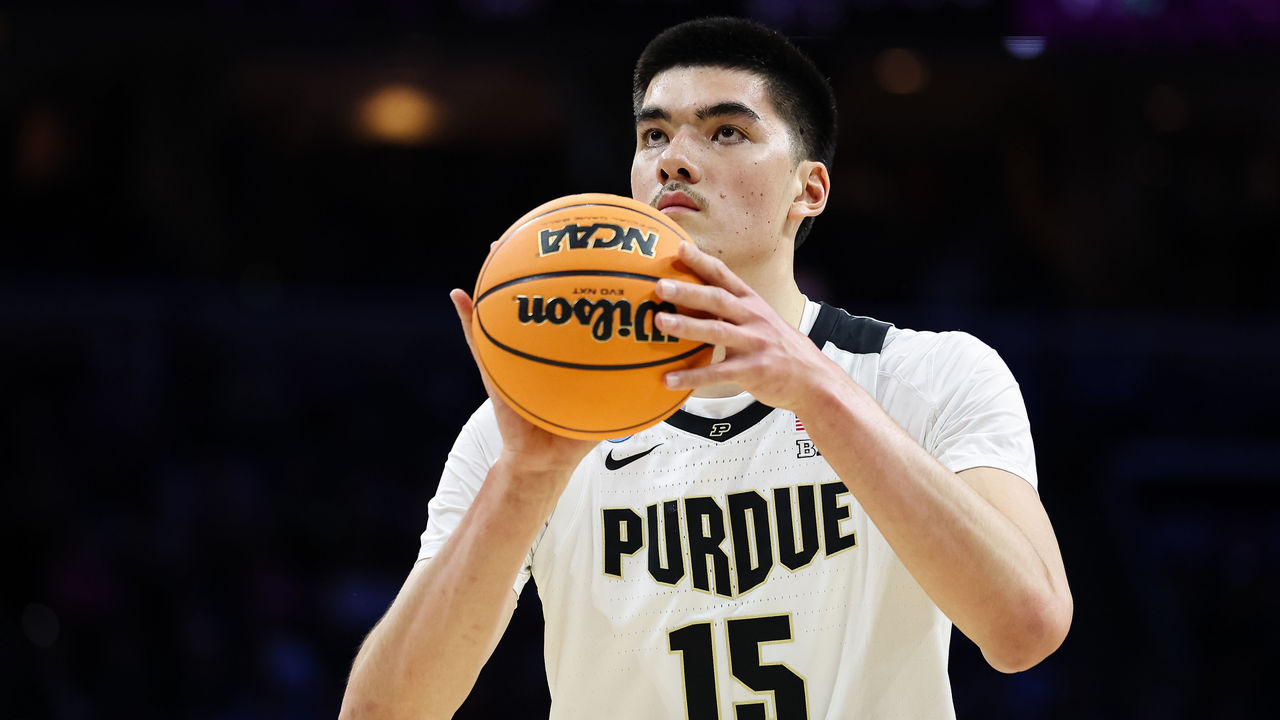
Purdue will go as far as Zach Edey takes it. The towering 7-foot-4 center averaged 14.4 points, 7.7 boards, and 1.2 blocks in just 19 minutes per game during the previous campaign. He finished third in the nation in field-goal percentage (64.8) and ninth in total offensive rebounds (117).
Edey's strong sophomore year earned him a spot on the All-Big Ten second team and Wooden Award late-season watch list. His career 36.5 player efficiency rating is the NCAA's highest mark since 2009-10 among players with at least 50 games played.
Edey split playing time at the 5 with Trevion Williams last season, but he'll be front and center after the latter turned pro. The Boilermakers should be in Big Ten contention once again if Edey continues to make the most of his minutes.
Iowa (26-10) - Breakout
A year ago, Keegan Murray took a huge sophomore leap, filling the shoes of All-American center Luka Garza. Iowa will be searching for something similar this season with Murray off to the Association.
A trio of juniors are the most likely breakout candidates on the Hawkeyes' roster. Expectations are high for Murray's twin brother Kris, who was an inside-out threat and among the conference's top shot-blockers despite coming off the bench.
Patrick McCaffery is another name to watch. The former four-star recruit played a complementary role on the NCAA's fifth-highest-scoring offense last season, posting 10.5 points per contest. Tony Perkins rounds out the shortlist of Iowa players poised to take the next step. The 6-foot-4 guard moved into the starting lineup midway through Big Ten play and flashed his ability to score at all three levels.
Rutgers (18-14) - Support
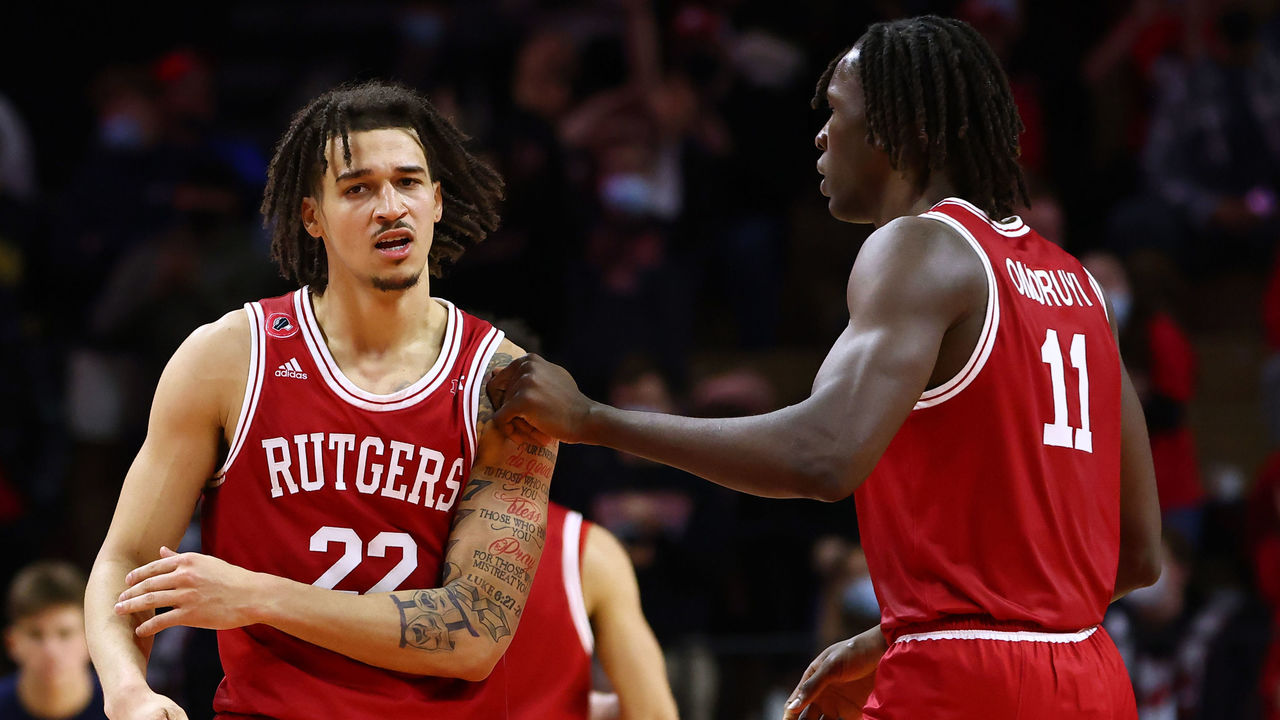
Rutgers made back-to-back NCAA Tournament appearances after a 30-year absence from the Big Dance. Multiple key players from those squads remain at Steve Pikiell's disposal this season.
Junior center Clifford Omoruyi is an interior force and worked on his jumper during the offseason. Fifth-year guard Caleb McConnell led all Big Ten players in steals (2.2 per contest) last season and was the conference's Defensive Player of the Year. Finally, point guard Paul Mulcahy is back to run the offense after averaging a career-high 5.3 assists per game in 2021-22, which ranked second in the Big Ten.
Pikiell knows he can rely on that trio, which started a combined 130 games over the previous two campaigns. The rest of the roster, however, poses questions. The Scarlet Knights lost Ron Harper and Geo Baker - their top two scorers a year ago - and must find a way to replace their production. Additionally, their highest returning scorer off the bench recorded only 4.3 points per contest. Rutgers' stars will need support if the team is to punch its ticket to the tourney.
Ohio State (20-12) - Freshmen
Chris Holtmann was busy in the transfer portal, adding versatile defender Isaac Likekele and sharpshooter Sean McNeil from Oklahoma State and West Virginia, respectively. But Ohio State's success will ultimately hinge on a strong recruiting class that features four top-60 prospects.
Bruce Thornton headlines the crop of newcomers. The 6-foot-1 guard is expected to share playmaking responsibilities with Likekele and could immediately step into the starting lineup. Felix Okpara is slated to back up Zed Key. The 6-foot-11 center's offensive game is still raw, but his shot-blocking ability will help a Buckeyes squad that's struggled defensively over the past two seasons.
Fellow four-star recruits Brice Sensabaugh and Roddy Gayle are also expected to factor into the rotation.
Michigan State (23-13) - Selflessness
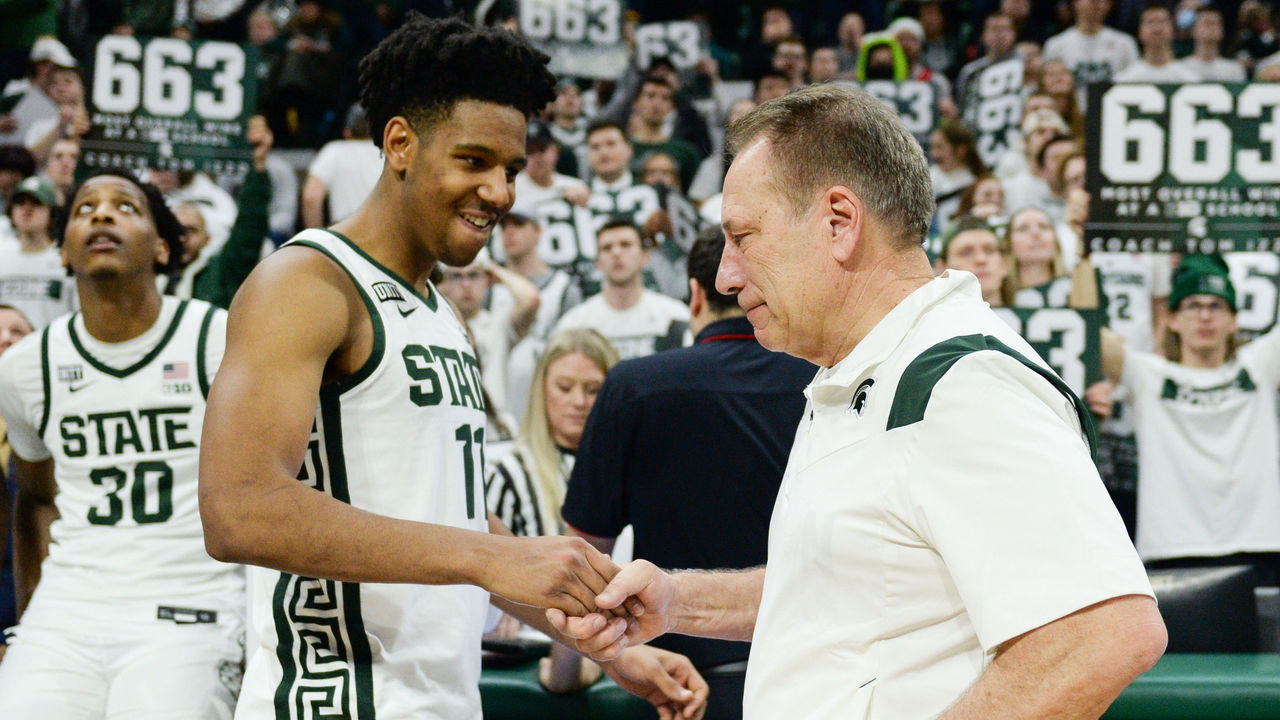
One of Michigan State's biggest strengths is sharing the rock. The Spartans were 30th in the NCAA last season with nearly 16 assists per contest. Guards A.J. Hoggard and Tyson Walker accounted for more than half of the team's total and were first and fifth, respectively, in the Big Ten in total assists.
The duo also took great care of the ball, each finishing in the nation's top 40 in assist-to-turnover ratio. Having both playmakers on the court together could take the Spartans' offense to another level.
Michigan (19-15) - Spacing
Michigan's outside shooting was a glaring weakness last season. The Wolverines made just 6.3 triples per game, which ranked 287th in the NCAA. Juwan Howard tried addressing that this summer, bringing in Jaelin Llewellyn and Joey Baker via the transfer portal.
Llewellyn shot a personal-best 38.6% from deep during the 2021-22 campaign, while Baker is a career 37.9% 3-point shooter. Terrance Williams drilled 38.5% of his triples in a reserve role last season and is expected to play a bigger part in his junior year. Incoming four-star recruit Jett Howard, Juwan's youngest son, is also expected to bolster Michigan's 3-point attack.
Hunter Dickinson will benefit the most from the bevy of sharpshooters around him. While he expanded his own shooting range, the 7-foot-1 center is at his best when operating in the low post.
Indiana (21-14) - Validation
Indiana was one of two Big Ten schools in the preseason AP poll. The 13th-ranked Hoosiers return four starters from last season's 21-win squad, including Trayce Jackson-Davis, who was recently named an AP preseason All-American.
Still, this is pretty much the same roster that finished under .500 in conference play and squeaked into the NCAA Tournament as one of the last four teams. Since its last Big Ten regular-season crown in 2016, Indiana hasn't finished higher than sixth.
Mike Woodson is banking on internal improvement and a pair of top-25 recruits to validate the buzz surrounding his program. Jalen Hood-Schifino is a natural playmaker, and Malik Reneau provides another post threat behind Jackson-Davis.
Maryland (15-17) - Transfers
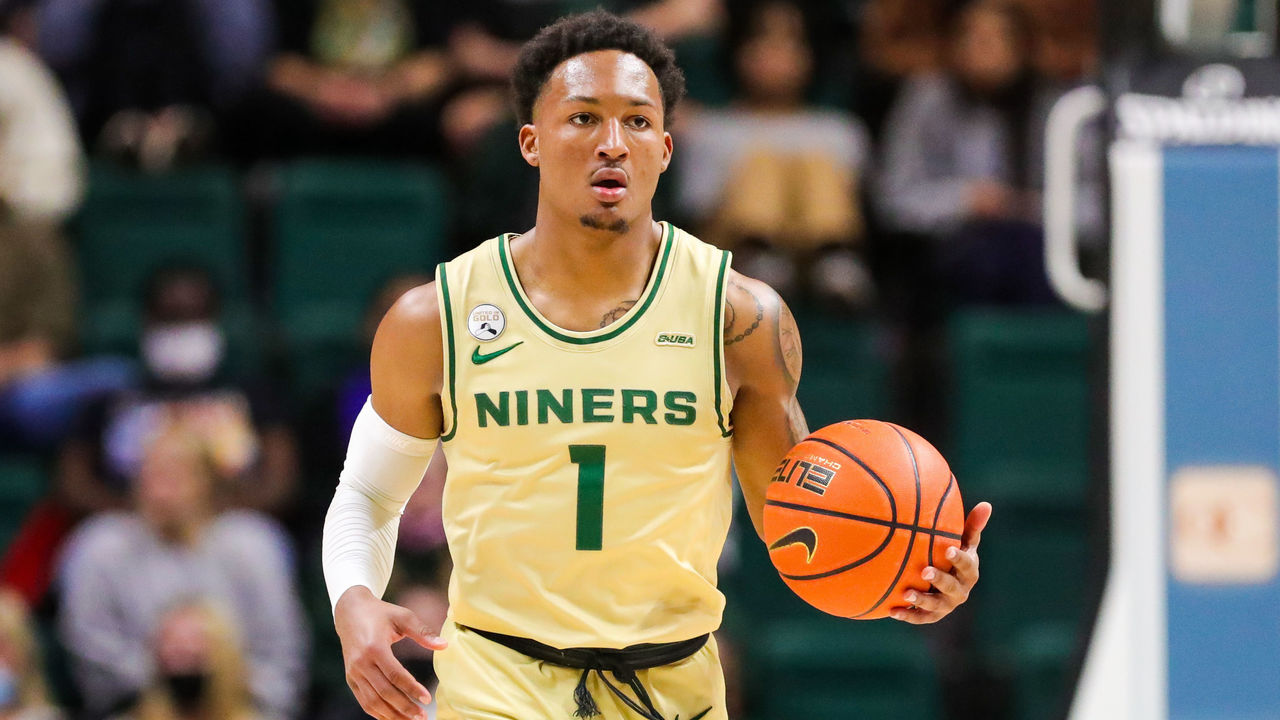
Kevin Willard hopes to restore pride in Maryland after a turbulent end to the Mark Turgeon era. The new Terrapins bench boss inherited some intriguing pieces and brought in some fresh faces to help get the program back on track.
The arrivals of transfers Jahmir Young and Don Carey will soften the loss of starting guards Eric Ayala and Fatts Russell.
Young was a three-year starter at Charlotte, averaging 16.7 points and converting 35% of his attempts from downtown. The 6-foot-2 guard rebounds well for his position and consistently gets to the charity stripe.
Meanwhile, Carey found success at each of his previous three stops, including 54 appearances in the competitive Big East with Georgetown. He shot a conference-leading 91% from the charity stripe last season. Young and Carey will have a lot on their plates as Maryland doesn't have much depth beyond its starting five.
Penn State (14-17) - Scrappy
Penn State was a scrappy group during Micah Shrewsberry's first year in charge. It bought into the bench boss' defensive-first approach, playing a physical but disciplined brand of basketball. That mentality kept the team in a handful of close games and led to a surprising 14-win campaign.
The Nittany Lions allowed just 65 points per contest, which ranked 50th in the nation. They also placed fourth in the Big Ten in opponent field-goal percentage (41.6). Jalen Pickett and Seth Lundy formed a lockdown defensive pair in the backcourt and return to lead the charge. An influx of transfers should boost Penn State's offense, but its hard play on the opposite end remains an integral part of its identity.
"I think it's always going to be a part of who we are," Shrewsberry said, according to Connor Crause of the Onward State. "I think it's a necessity not because of our personnel - it's a necessity because you have to win that way. If you want to be a team that's at the top of the Big Ten, you have to be that way."
Northwestern (15-16) - Jeopardy
Chris Collins solidified his place in Northwestern history when he guided the school to its first NCAA Tournament berth in 2016-17. The breakout campaign earned the former Duke assistant an extension through 2024-25. Unfortunately, he hasn't done much since then.
The Wildcats have gone 60-90 over the past five seasons, including a 26-71 mark in Big Ten play. Just two top-100 recruits have committed to the school during that span.
Collins only has two winning campaigns heading into his 10th year at Northwestern. The 48-year-old has his work cut out for him, especially with last season's leading scorer Pete Nance transferring to North Carolina.
Nebraska (10-22) - Ultimatum
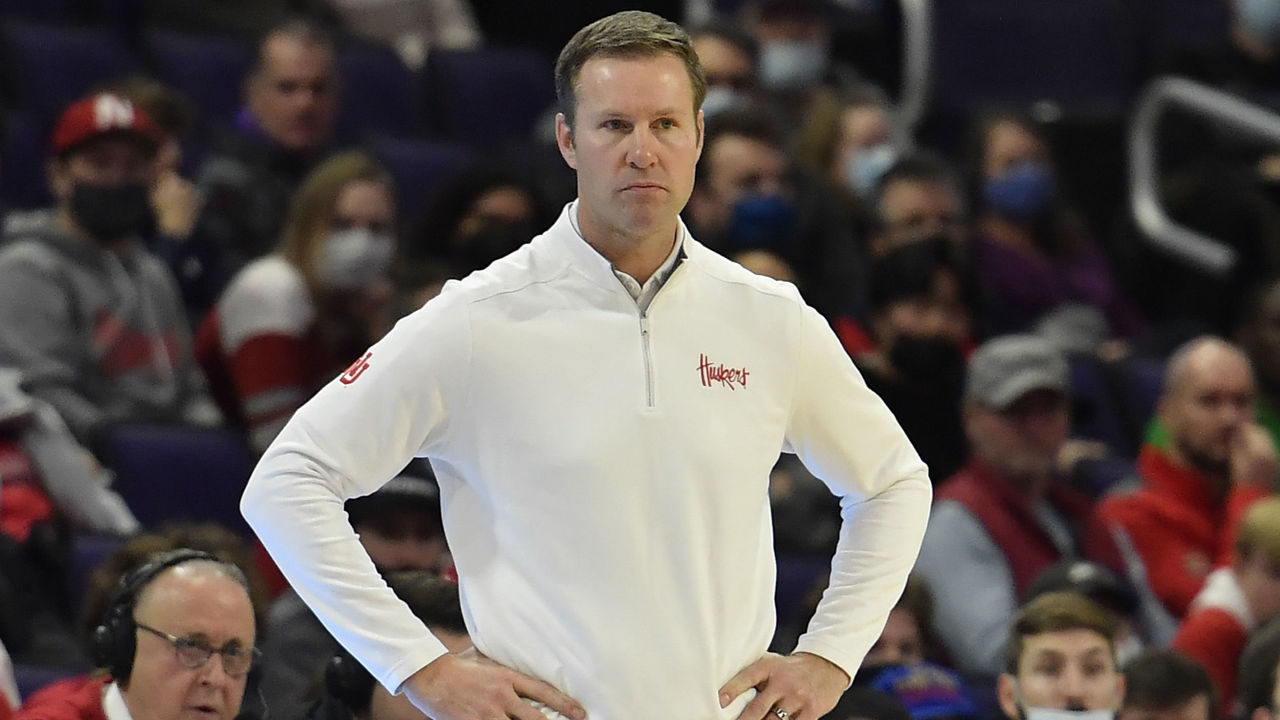
Fred Hoiberg never registered a sub-.500 record over five years at Iowa State. Since taking over at Nebraska in 2019, he hasn't recorded more than 10 wins in a single season.
Hoiberg's homecoming has been disastrous to say the least. The Cornhuskers are 9-50 in Big Ten play during his tenure, finishing dead last in each of the previous three campaigns. The 50-year-old is responsible for all three 20-loss seasons in program history.
Time is running out for Hoiberg. He agreed to a reduced salary and buyout in the offseason. Anything short of a drastic improvement will likely spell the end for Hoiberg.
Minnesota (13-17) - Progression
Minnesota showed some life in its first year under Ben Johnson, beating Michigan on the road as part of a 10-1 start to the previous campaign. While the Golden Gophers were unable to sustain that play, it's certainly a foundation the program can build upon.
With eight freshmen and sophomores on the roster, Johnson can further establish an identity for his club beyond the 2022-23 campaign. A pair of season-ending injuries to forwards Parker Fox and Isaiah Ihnen put a damper on expectations, but keeping the positive momentum going is crucial.
Minnesota already secured a commitment from four-star prospect Dennis Evans for next season. Racking up more wins will certainly help Johnson's future recruiting efforts.
HEADLINES
- Top-ranked Arizona withstands late rally by No. 13 BYU to remain unbeaten
- No. 4 Duke routs No. 20 Louisville in ACC showdown
- Alabama's Bediako to play another game after judge postpones hearing
- AP Poll: Arizona still unanimous No. 1 ahead of showdown with No. 13 BYU
- Pearl gets signature win, proves Auburn's rebuild is coming together